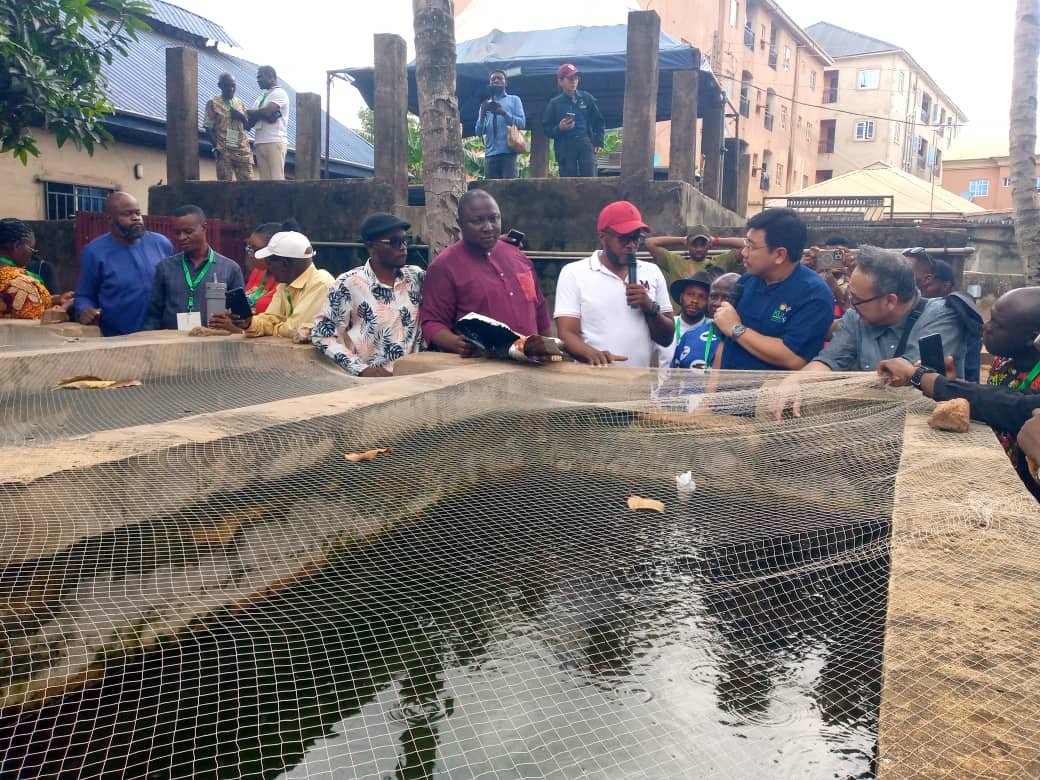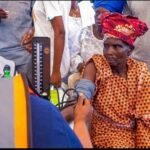Delegation from Kasetsart University, Thailand and members of Federal Co-operative College (FCC), Oji River inspecting fish farm in Anambra State
By Kenechukwu Ofomah
Awka
A delegation from the Kasetsart University, Thailand, has visited the Fisheries and Aquaculture Business Development Agency (FABDA) in Anambra State and a private fish farm, House of Tully, as part of a collaborative initiative with the Federal Co-operative College (FCC), Oji River, aimed at boosting the catfish industry in Nigeria, particularly in the Southeast region.
The visit followed a two-day National Fish Breeding Workshop held at FCC Oji River, Enugu State, during which the Managing Director and Chief Executive Officer of FABDA, Mr. Emeka Iloghalu, delivered a keynote address highlighting progress in organizing and streamlining the fisheries and aquaculture value chain in Nigeria.
This collaboration aligns with ongoing efforts to establish a Brood Stock Bank to support fish farming across the Southeast, with Anambra State serving as a pilot location for increased table fish production.
During the field tour, the delegation from Kasetsart University led by Prof. Kornsorn Srikulnath, Assistant to the President for Research and Internationalization and the FCC team headed by Provost Dr. Ejikeme Obidiegwu, visited House of Tully Farms. There, they observed catfish production operations firsthand, including brood stock farming, fingerlings production, table fish rearing, and fish processing, among other aspects of the value chain.
Speaking during the visit, Prof. Srikulnath emphasized the significance of the catfish supply chain in Nigeria, noting that the country is a global player in catfish production.
“We are here to understand the catfish supply ecosystem because Nigeria is a major stakeholder globally. From what we have seen, the state already has critical infrastructure across the supply chain, including fish processing facilities,”
“However, we believe collaboration is necessary to improve the processes and scale the impact.”he said.
In his remarks, Dr. Obidiegwu explained that the visit underscores the shared commitment to food security and sustainable agricultural development.
“We felt it was important for our Thai partners to visit a leading integrated urban fish farm in Awka,”
“We’ve all gained practical insights from the operations here, and our partners have seen the potential for themselves. FABDA, FCC, and private businesses are all stakeholders in this effort. FABDA, in particular, plays a strategic role in advancing the entire fish value chain and remains a close partner of the college.”he said.
He expressed optimism that the collaboration would result in impactful projects in the near future.
Also speaking, Mr. Iloghalu, MD/CEO of FABDA, said the visit was a key step toward deepening the agency’s partnership with FCC and the Thai delegation, particularly in the areas of brood stock development and genetic research.
“Thailand has demonstrated significant expertise in fish breeding and genetics,”
“One of our key proposals is to establish a Brood Stock Bank in this region to ensure sustainable seed fish supply.”Iloghalu noted.
Reiterating FABDA’s vision to boost table fish production in Anambra to 51 million kilograms annually, Iloghalu stressed that such a target requires a consistent and reliable supply of seed fish, which can only come from a well-established brood stock system.
“Table fish production doesn’t just happen,it starts with quality seed fish, which in turn come from genetically sound brood stock. This collaboration is crucial because once we secure a stable brood stock supply, the rest of the chain becomes more predictable and scalable,”
“This will help us hit our short-term goal of self-sufficiency in fish production in Anambra and move toward industrial-scale output and exports as a medium-term objective.”he said.
He added that FABDA’s mandate is to reposition the fisheries and aquaculture sector in Anambra State for improved governance, regulation, productivity, and inclusive growth. A major part of this involves guiding operators in the sector to function in a more organized and cooperative fashion.
“Our goal is to comprehensively profile all fish businesses across the state,”
“This allows us to identify their unique challenges and eliminate the disorganized nature of the industry we inherited.”he explained.
Referring to House of Tully as a case study, Iloghalu said the farm has successfully streamlined its operations, creating distinct business units that can attract investors and promote specialization.
“We are encouraging operators to specialize in specific segments of the value chain—whether brood stock farming, fingerlings, grow-out production, or processing,”
“By doing so, FABDA can effectively link stakeholders, drive strategic investments, and build a more resilient and productive aquaculture sector.” he said.



























